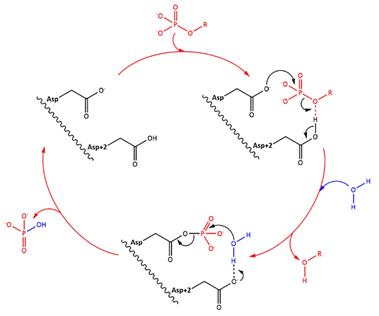We apologize for Proteopedia being slow to respond. For the past two years, a new implementation of Proteopedia has been being built. Soon, it will replace this 18-year old system. All existing content will be moved to the new system at a date that will be announced here.
Sandbox Reserved 1480
From Proteopedia
(Difference between revisions)
| Line 19: | Line 19: | ||
Different studies have shown that LHPP is a risk factor in cancer and major depressive disorder. | Different studies have shown that LHPP is a risk factor in cancer and major depressive disorder. | ||
| - | It has also been shown that LHPP is a histidine phosphatase and a tumour suppressor in hepatocellular carcinoma. This study shown that LHPP was downregulated in hepatocellular carcinoma, but also two histidine phosphatases (NME1 and NME2) were upregulated. Thus, the regulation of protein phosphorylation is important for the integrity of the cell and when deregulated could lead to tumorigenesis. They also shown that LHPP act mainly on N3-phosphorylated proteins. | + | It has also been shown that LHPP is a histidine phosphatase and a tumour suppressor in hepatocellular carcinoma that removes histidine-linked phosphate groups from proteins. The absence of LHPP promotes the growth of tumors via increasing histidine-phosphorylated proteins. This study shown that LHPP was downregulated in hepatocellular carcinoma, but also two histidine phosphatases (NME1 and NME2) were upregulated. Thus, the regulation of protein phosphorylation is important for the integrity of the cell and when deregulated could lead to tumorigenesis. They also shown that LHPP act mainly on N3-phosphorylated proteins. |
| + | The researchers led by Prof. Michael N. Hall from the Biozentrum, University of Basel, report in “Nature” that LHPP can also serve as a biomarker for the diagnosis and prognosis of liver cancer. | ||
== Relevance == | == Relevance == | ||
Revision as of 14:42, 7 January 2019
| This Sandbox is Reserved from 06/12/2018, through 30/06/2019 for use in the course "Structural Biology" taught by Bruno Kieffer at the University of Strasbourg, ESBS. This reservation includes Sandbox Reserved 1480 through Sandbox Reserved 1543. |
To get started:
More help: Help:Editing |
Structure of the protein LHPP
| |||||||||||
References
"Molecular cloning of a cDNA for the human phospholysine phosphohistidine inorganic pyrophosphate phosphatase." Yokoi F., Hiraishi H., Izuhara K. J. Biochem. 133:607-614(2003) [PubMed] [Europe PMC] [Abstract]

